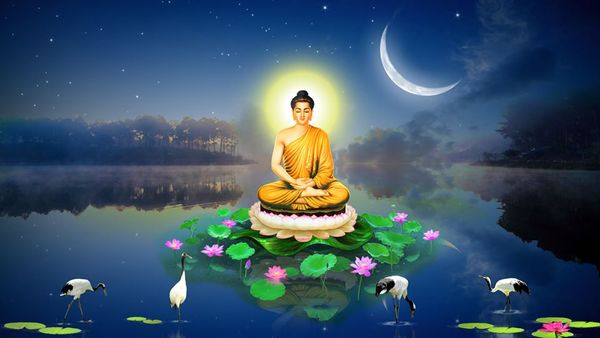Seven meanings of Buddha's day
2604 years ago, at Bodh Gaya, there was a person who appeared in the world who shocked the world, a great man appeared, he entered the truth, attained the ultimate fruition, ended his life. Long battle with the evil Demon King of affliction. He is Buddha Shakyamuni - an enlightened being, a teacher of God - Man.
After six years of ascetic practice to no avail, he decided to meditate under the Bodhi tree with a vow: "If I sit here and do not find the mysterious doctrine, do not find the mystery of the universe of all things, then even Broken flesh, broken bones, I am determined not to leave this place." After 49 days and nights of sitting quietly under the Bodhi tree, intensively in meditation, practicing the separation of desires and evils, he conquered both internal and external obstacles. by Thien Nhan Minh. In the third watch, he contemplated the depths of beginningless ignorance, penetrated to the root of all dharmas, his mind was completely liberated from the taint of sensuality (the defilement of desire), the taint of existence (the defilement of attachment to life). ) and Ignorance (pollution of ignorance), completely ending birth and death, samsara, suffering for thousands of kalpas. At that point, he was able to prove to the Ming Dynasty.
When the rain and thunder gradually stopped, watching the morning star rise was also the time when he completely attained the Three Intelligences, attained Perfect Enlightenment, and became a Buddha with the name Shakyamuni. He was 35 years old that year, on December 8, 584 BC.

The event of Buddha's Enlightenment is of great significance, a great day in the joy of Buddhists in particular and Buddhism in general: he officially turned the wheel of Dharma, bringing compassion, wisdom and solution to the Dharma. escape to lead sentient beings towards enlightenment.
Seven meanings of Buddha's enlightenment day
- The first meaning of Enlightenment says that the way to liberation is the Middle Way.
- The second meaning is that by one's own efforts, with the right practice of the Dharma, one can attain enlightenment in this life.
- The third meaning, the content of the Enlightenment is the elimination of ignorance, craving, and clinging (the cessation of the Twelve Causes and Conditions), or the elimination of the Ten fetters.
- The fourth meaning, having the event of Enlightenment means ignorance, love, and attachment... not really having, or not having a self. The self is only a product of ignorance, not of reality.
- The fifth meaning, the Buddha attained enlightenment means that the dharmas are viewed under the view of non-attachment, seen free from the signs or the sign of No-self.
- The sixth meaning, Enlightenment is to return to the True Dharma, to return to "Non-Birth", to "Cill away", to come out with all the dual meanings of permanence, cessation, past, future, existence, non-being, arising and passing away.
- The seventh meaning, the Buddha's Enlightenment event opens for mankind a way out of suffering, a belief in escaping suffering.
(Excerpt from "Buddha - Nirvana - Enlightenment" - HT. Thich Chan Thien)


































